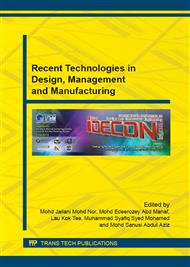p.165
p.170
p.175
p.180
p.186
p.191
p.196
p.202
p.211
A Study on Tool Allocation Method Considering Load Balancing and Optimization of Transportation Based on Mathematical Programming
Abstract:
A new tool allocation method is proposed in this paper to consider both the load balancing and optimization of a transportation based on a mathematical problem. The proposed tool allocation method consists of two steps. In the first step, the individual tools are divided into tool sets based on 0-1 programming problem in order to balance a total machining time by using the individual tool sets and reducing a total number of transportation processes. In the second step, the individual tool sets are allocated to the Machining Centers (MCs) based on a quadratic assignment problem in order to minimize transportation total distances of jobs.
Info:
Periodical:
Pages:
186-190
DOI:
Citation:
Online since:
May 2015
Authors:
Price:
Сopyright:
© 2015 Trans Tech Publications Ltd. All Rights Reserved
Share:
Citation:


